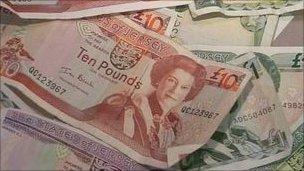Jersey politicians debate changes to business tax
- Published

The business tax system - zero-10 - will be changed if States members agree
Changes to Jersey's controversial business tax system will be debated by States members in July.
The zero-10 tax measures mean Jersey companies pay tax while foreign-owned businesses do not.
The Treasury Minister said he would bow to pressure and change small parts of the tax because of what the EU Code of Conduct Group called "harmful effects".
The parts of the system that will change are called attribution and deemed distribution tax.
They refer to foreign shareholders of Jersey companies who do not pay Jersey tax on their profits, while local shareholders do.
'Fully compliant'
Senator Philip Ozouf said: "We are confident... this positive action will result in Jersey's tax regime being considered fully compliant with the code.
"We can then keep our existing corporate tax regime while also meeting the concerns of the EU.
"Maintaining tax neutrality provides stability and certainty for businesses operating here and sends a clear signal that Jersey continues to provide a competitive tax system which will safeguard the island's future economic well-being," he said.
The issues will be debated in the States on 5 July and if agreed will come into effect in January.
The Treasury said it would cause a "cash flow problem" of about £10m a year but was not expected to cause "a reduction in the total tax take".
Geoff Cook, Chief Executive, Jersey Finance Limited, said: "I believe it is helpful that the Jersey Government is seen to be taking a lead on this issue, by proposing that the measures which the EU have voiced concerns about are removed, while at the same time retaining the main features of Jersey's corporate tax regime, in particular the key element that most companies will continue to pay tax at 0%."
- Published15 February 2011
- Published4 February 2011